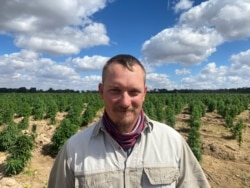Zimbabwe recently scrapped rules requiring sole state ownership for cannabis farming to encourage investment in the plant for industrial and medicinal uses. Zimbabwe is Africa's largest tobacco producer, but authorities expect hemp export earnings to start replacing tobacco as farmers seek higher earnings from the crop.
Farmer Jesper Kirk has been growing mainly tobacco since he moved to a 250-hectare farm five years ago. He now plans to increase his hectarage of hemp, a type of cannabis plant that has very low levels of THC — the intoxicating substance in marijuana — when the growing season begins in a few months.
"I went for hemp because it is an export crop,” he said. “Much more reliable market. Whereas, for example potatoes, local market crop is a little more unstable market in terms of the number of people growing it. So, I wanted a slightly stable market in terms of demand."
About five years ago, Zimbabwe Industrial Hemp Trust led experiments raising cannabis and the project has spread to several parts of Zimbabwe.
The trust is providing technical assistance and looking for markets for farmers, said the group’s head, Dr. Zorodzai Maroveke.
She said Zimbabwe is making a smart choice with cannabis, since the tobacco market is shrinking because of anti-smoking campaigns.
"It’s most relevant now considering the threat that the tobacco industry faces and knowing very well that Zimbabwe heavily depends on tobacco production,” she said. “It’s relevant that our economy has to start looking for alternatives. And I think industrial hemp tops the list. It's a green crop and there is a lot of social impact in comparison to tobacco. I think in 10 years you will see the value chains that will come out of this sector are way more than tobacco."
While Kirk is thinking of exporting his crop, Walter Ruprecht has used some hemp produced by farmers this year to produce paper. He said cannabis has a lot of potential for Zimbabwe, both for industrial and even medicinal use.
“The advantages are that it is obviously going to create thousands of jobs in the farming areas, just like what tobacco has done for decades,” he said. “Hemp has many advantages for its medicinal interests at the moment. However, there are other composites that can be available that it can be used such as textiles, pulp and paper. It’s a nitrogen supplement to the soil, it eliminates weeds. It has so many advantages to the small farmers and of course the value chains, which stretches to hundreds of thousands of dollars of opportunities."
The global cannabis industry is expected to be a $46 billion business worldwide in three years — up from $16.47 billion this year, said Tino Kambasha of the Zimbabwe Investment Development Agency.
“So, it's a market that is growing fast and we think it’s going to be a game-changer for this country,” Kambasha said. “And Zimbabwe has gone a little step further to show that it is willing work with its partners and investors. By coming up with an investor agreement which further protects you against anything like expropriation and change or changes in law, which is quite great."
Because of the new cannabis regulations, Kambasha added, Zimbabwe has attracted investors from the U.S., Britain, Germany, Switzerland and other countries.
That might be a needed shot in the arm for Zimbabwe’s economy, which has been stuck in the doldrums for more than 20 years.







